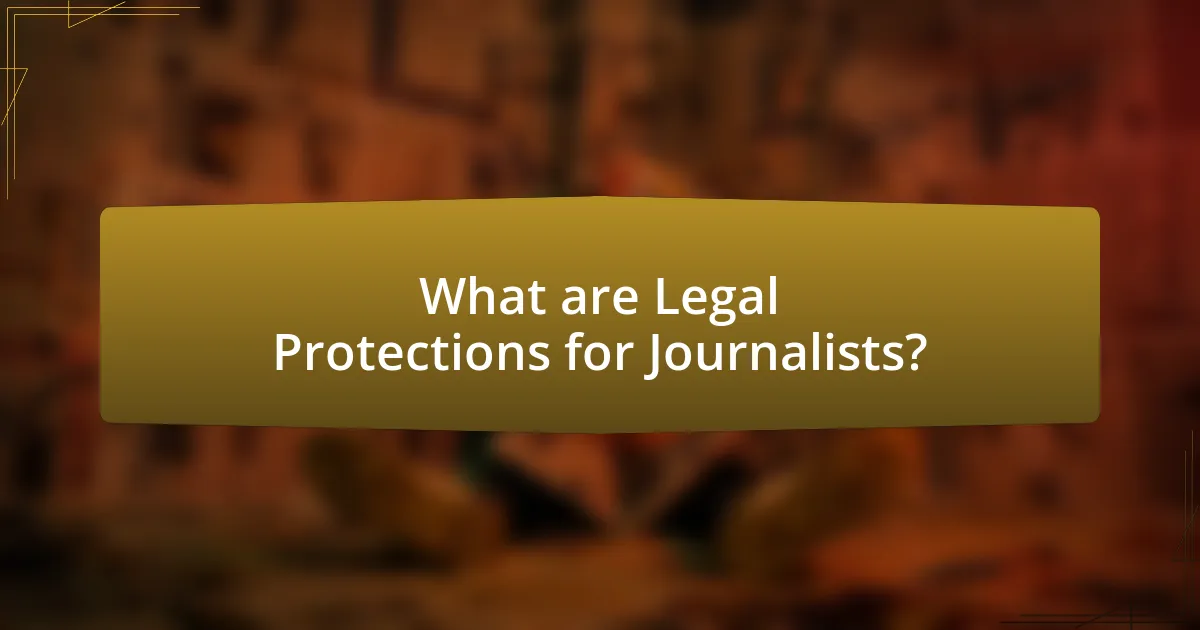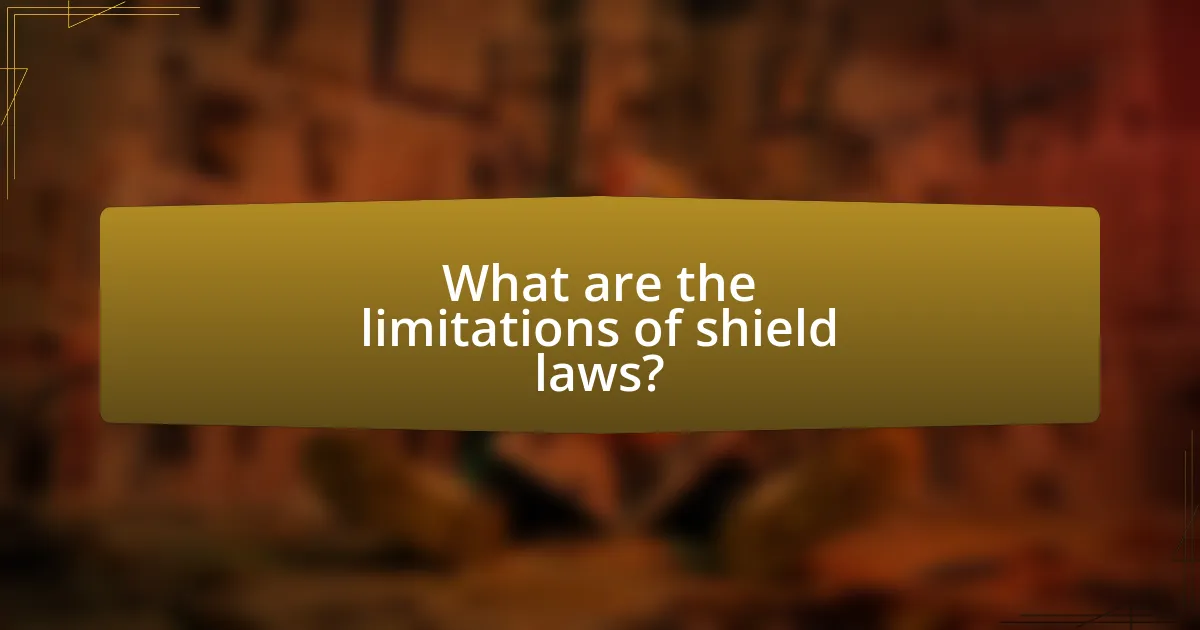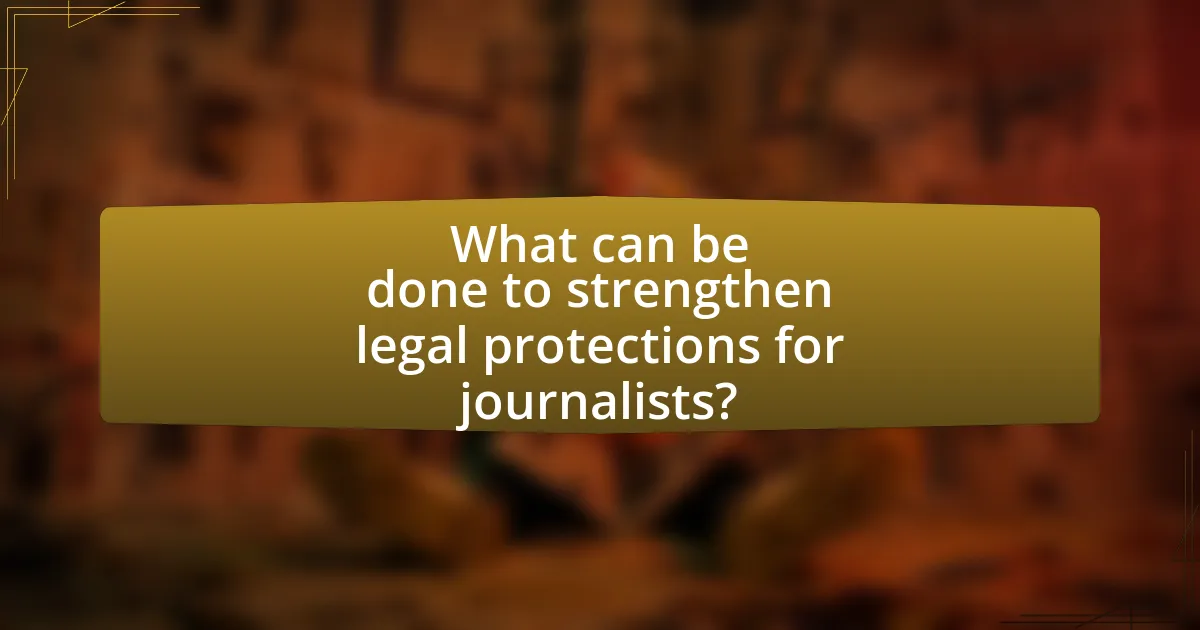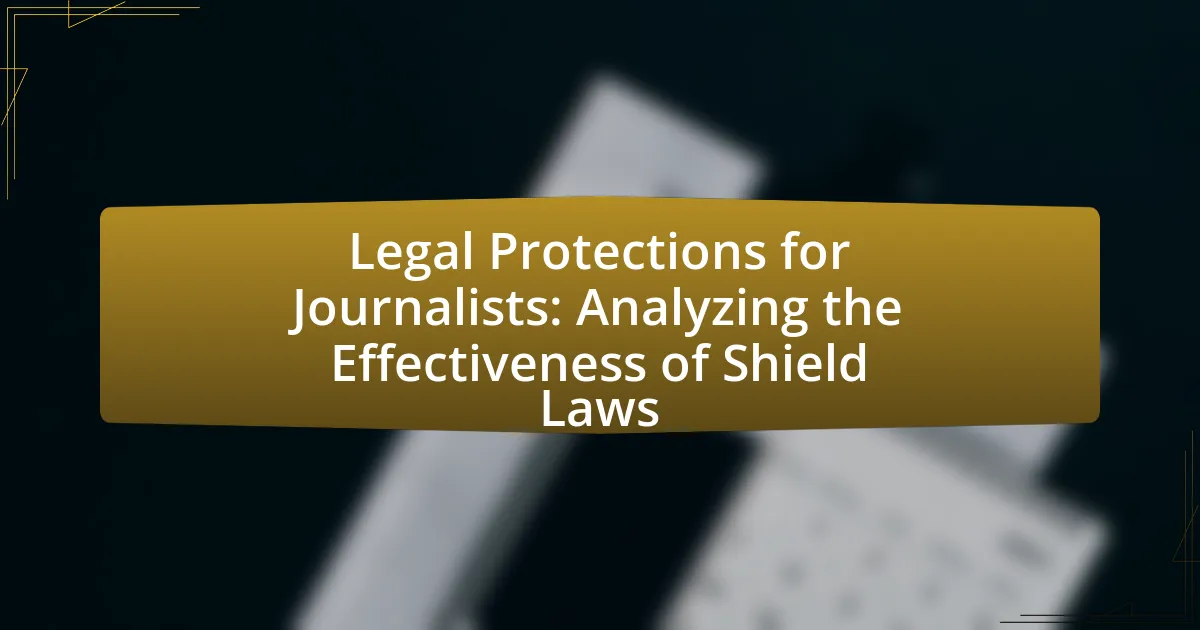Legal protections for journalists, particularly shield laws, play a crucial role in safeguarding the freedom of the press by allowing journalists to refuse to disclose confidential sources in legal proceedings. As of 2023, 49 states in the U.S. have enacted some form of shield law, reflecting a commitment to protect journalistic activities. This article analyzes the importance of these legal protections, the risks journalists face without them, and the effectiveness of shield laws in promoting investigative journalism. It also explores the historical context, limitations, and criticisms of shield laws, as well as potential reforms to strengthen protections for journalists in an evolving media landscape.

What are Legal Protections for Journalists?
Legal protections for journalists primarily include shield laws, which allow journalists to refuse to disclose confidential sources and information in legal proceedings. These laws aim to safeguard the freedom of the press and encourage the flow of information to the public. For instance, as of 2023, 49 states in the U.S. have enacted some form of shield law, reflecting a commitment to protect journalistic activities. Additionally, the First Amendment of the U.S. Constitution provides a fundamental legal framework that supports freedom of speech and press, further reinforcing protections for journalists against censorship and legal repercussions for their reporting.
Why are legal protections important for journalists?
Legal protections are important for journalists because they safeguard the freedom of the press and enable journalists to report without fear of retaliation or legal repercussions. These protections, such as shield laws, allow journalists to maintain confidentiality of sources, which is crucial for investigative reporting and uncovering corruption. For instance, in the United States, shield laws exist in many states to protect journalists from being compelled to disclose their sources in court, thereby fostering a more open and transparent society. Without these legal safeguards, journalists may face intimidation, harassment, or legal action that could hinder their ability to inform the public effectively.
What risks do journalists face without legal protections?
Journalists face significant risks without legal protections, including harassment, imprisonment, and violence. The absence of legal safeguards can lead to increased vulnerability to threats from both state and non-state actors, as they may be unable to defend themselves against censorship or retaliation for their reporting. According to the Committee to Protect Journalists, in 2021, over 300 journalists were imprisoned worldwide, often due to their work in exposing corruption or human rights abuses, highlighting the dangers faced in environments lacking legal protections.
How do legal protections support freedom of the press?
Legal protections support freedom of the press by establishing frameworks that safeguard journalists from censorship and legal repercussions. These protections, such as shield laws, allow journalists to refuse to disclose confidential sources and information, thereby encouraging the flow of information without fear of retaliation. For instance, in the United States, many states have enacted shield laws that protect reporters from being compelled to testify about their sources in court, which fosters investigative journalism and public accountability. This legal backing is crucial for maintaining a vibrant and independent press, as it empowers journalists to report on sensitive issues without the threat of legal consequences.
What are shield laws?
Shield laws are legal provisions that protect journalists from being compelled to disclose confidential sources or unpublished information in legal proceedings. These laws aim to ensure that journalists can report freely without fear of legal repercussions, thereby promoting the public’s right to know. For instance, as of 2023, 49 states in the U.S. have some form of shield law, reflecting a widespread recognition of the importance of protecting journalistic sources to maintain a free press.
How do shield laws differ from other legal protections?
Shield laws specifically protect journalists from being compelled to disclose confidential sources or unpublished information in legal proceedings, whereas other legal protections may not offer such specific safeguards for journalistic activities. For example, general privacy laws protect individuals’ personal information but do not necessarily extend to the confidentiality of sources used by journalists. Additionally, shield laws are designed to uphold the First Amendment rights of freedom of speech and press, which distinguishes them from broader legal protections that may not prioritize these rights. The existence of shield laws in 49 states and the District of Columbia demonstrates their recognition as essential legal protections for journalists, highlighting their unique role in fostering investigative journalism and protecting the public’s right to know.
What is the historical context of shield laws in journalism?
Shield laws in journalism emerged primarily in the United States during the 20th century as a response to increasing legal pressures on journalists to disclose their sources. The historical context began with the 1972 case of Branzburg v. Hayes, where the Supreme Court ruled that journalists do not have a constitutional right to refuse to testify before a grand jury. This decision highlighted the need for legal protections, leading to the introduction of state-level shield laws starting in the 1970s, which aimed to protect journalists from being compelled to reveal confidential sources and information. By 2023, 49 states and the District of Columbia had enacted some form of shield law, reflecting a growing recognition of the importance of source confidentiality in promoting investigative journalism and protecting press freedom.
How effective are shield laws in protecting journalists?
Shield laws are moderately effective in protecting journalists, as they provide legal safeguards against compelled disclosure of sources and information. These laws vary significantly by jurisdiction, with some states offering robust protections while others have limited or no shield laws. For instance, 40 states and the District of Columbia have enacted some form of shield law, which can prevent journalists from being forced to reveal their sources in court. However, the effectiveness of these laws can be undermined by exceptions, such as national security concerns or criminal investigations, which may allow courts to compel disclosure despite the existence of shield laws. Additionally, the lack of a federal shield law means that journalists operating in states without protections face greater risks.
What challenges do journalists face when invoking shield laws?
Journalists face several challenges when invoking shield laws, primarily including varying state interpretations and the lack of federal protection. Different states have different definitions of what constitutes a journalist and the scope of protection offered, leading to inconsistencies in legal outcomes. For instance, some states may require journalists to prove that their work is part of a recognized media organization, while others may not. Additionally, the absence of a comprehensive federal shield law means that journalists often have to navigate a patchwork of state laws, which can complicate their ability to protect sources effectively. This inconsistency can result in legal uncertainty and increased risk of prosecution or civil liability for journalists attempting to shield their sources.
How do different states implement shield laws?
Different states implement shield laws by enacting specific statutes that protect journalists from being compelled to disclose confidential sources or unpublished information in legal proceedings. For example, California’s shield law provides broad protections for journalists, allowing them to refuse to testify about their sources, while New York’s law includes similar provisions but also specifies certain exceptions, such as cases involving imminent threats to public safety. Additionally, some states, like Texas, have enacted laws that protect journalists but require them to demonstrate that the information sought is not available through other means. These variations reflect the states’ legislative priorities and interpretations of the balance between press freedom and legal obligations.

What are the limitations of shield laws?
Shield laws have several limitations, primarily concerning their applicability and scope. Many shield laws vary significantly by jurisdiction, meaning that protections for journalists can differ widely across states or countries, leading to inconsistencies in legal coverage. Additionally, shield laws often do not protect journalists from federal subpoenas, limiting their effectiveness in cases involving federal investigations. Furthermore, some shield laws include exceptions for national security, criminal investigations, or civil litigation, which can undermine the protections offered to journalists. These limitations highlight the challenges journalists face in maintaining confidentiality and protecting sources, as evidenced by cases where courts have ruled against journalists despite the existence of shield laws.
What are the common criticisms of shield laws?
Common criticisms of shield laws include their inconsistency across jurisdictions, which can lead to confusion and unequal protections for journalists. Critics argue that some shield laws are too narrow, only protecting certain types of information or sources, thereby limiting their effectiveness. Additionally, opponents contend that shield laws can hinder law enforcement investigations by obstructing access to crucial evidence. Furthermore, there are concerns that shield laws may be misused by journalists to shield unethical practices or to avoid accountability. These criticisms highlight the ongoing debate about the balance between protecting journalistic freedom and ensuring accountability in the media.
How do shield laws vary in effectiveness across jurisdictions?
Shield laws vary in effectiveness across jurisdictions primarily due to differences in their scope, definitions of protected individuals, and the circumstances under which protection is granted. For instance, some states in the U.S. offer broad protections that cover all journalists, while others limit protections to specific types of media or require a formal relationship between the journalist and the source. Additionally, the legal standards for compelling testimony or source disclosure can differ significantly; some jurisdictions may require a higher burden of proof for authorities to override shield laws, while others may have more lenient standards. This inconsistency can lead to varying levels of protection for journalists, impacting their ability to report freely and securely. For example, a study by the Reporters Committee for Freedom of the Press in 2021 highlighted that states like California and New York have robust shield laws, whereas states like Texas have more restrictive provisions, illustrating the disparity in effectiveness across different legal frameworks.
What are the implications of weak shield laws for investigative journalism?
Weak shield laws significantly undermine investigative journalism by failing to protect journalists from compelled disclosure of their sources. This lack of protection can deter whistleblowers from coming forward, as they may fear legal repercussions or retaliation, thereby limiting the flow of critical information necessary for public interest reporting. For instance, a study by the Reporters Committee for Freedom of the Press indicates that in jurisdictions with weak shield laws, journalists are more likely to face subpoenas, which can lead to legal battles that distract from their investigative work. Consequently, weak shield laws can result in a chilling effect on journalistic inquiry, ultimately diminishing the quality and quantity of investigative reporting that holds powerful entities accountable.
How do shield laws interact with other legal frameworks?
Shield laws interact with other legal frameworks by providing specific protections for journalists while also navigating the complexities of constitutional rights, such as the First Amendment, and statutory laws, including those related to evidence and criminal procedure. These laws often create a balance between the public’s right to know and the legal obligations of journalists, allowing them to refuse to disclose sources in legal proceedings. For instance, in cases like Branzburg v. Hayes, the U.S. Supreme Court acknowledged the tension between journalistic privilege and the government’s interest in law enforcement, illustrating how shield laws can both support and conflict with other legal principles.
What role do federal laws play in the protection of journalists?
Federal laws play a crucial role in the protection of journalists by establishing legal frameworks that safeguard their rights and ensure their ability to report without fear of retaliation. Specifically, laws such as the First Amendment of the U.S. Constitution guarantee freedom of speech and press, which are foundational to journalistic practice. Additionally, federal shield laws, although not universally enacted, provide journalists with the right to refuse to disclose confidential sources and information in legal proceedings, thereby protecting their sources and the integrity of their reporting. For instance, the proposed Free Flow of Information Act aims to create a federal shield law that would protect journalists from being compelled to reveal their sources in federal court, reinforcing the legal protections available to them.
How do shield laws coexist with national security laws?
Shield laws coexist with national security laws by providing journalists with protections to maintain confidentiality while balancing the need for national security. Shield laws allow journalists to refuse to disclose sources or information obtained in the course of reporting, which is crucial for investigative journalism. However, national security laws may require disclosure in cases where information poses a threat to national safety or security. For instance, the U.S. Supreme Court has ruled that national security interests can override shield protections when the government demonstrates a compelling need for the information. This coexistence creates a complex legal landscape where journalists must navigate the tension between their rights to protect sources and the government’s obligation to ensure national security.

What can be done to strengthen legal protections for journalists?
To strengthen legal protections for journalists, enacting comprehensive shield laws at the federal level is essential. Shield laws protect journalists from being compelled to disclose confidential sources and information, which is crucial for investigative reporting. For instance, the lack of a federal shield law has led to numerous cases where journalists faced legal repercussions for protecting their sources, undermining press freedom. Additionally, enhancing penalties for violence against journalists and ensuring accountability for those who threaten or harm them can further safeguard their rights. According to the Committee to Protect Journalists, countries with robust legal frameworks for press protection experience lower rates of violence against journalists, demonstrating the effectiveness of such measures.
What reforms are necessary for improving shield laws?
Reforms necessary for improving shield laws include establishing clearer definitions of journalistic activities and expanding protections to cover digital communications. Clear definitions help delineate who qualifies for protection under shield laws, ensuring that freelance journalists and digital content creators are included. Expanding protections to digital communications acknowledges the evolving nature of journalism in the digital age, where information is often shared through various online platforms. These reforms are supported by the increasing recognition of the need for comprehensive protections in light of rising threats to press freedom, as evidenced by the 2021 report from the Committee to Protect Journalists, which highlighted the growing number of legal challenges faced by journalists globally.
How can advocacy groups influence the development of stronger protections?
Advocacy groups can influence the development of stronger protections by mobilizing public support, engaging in lobbying efforts, and providing expert testimony to lawmakers. These organizations often raise awareness about the challenges faced by journalists, which can lead to increased public pressure on legislators to enact protective measures. For instance, the Reporters Committee for Freedom of the Press has successfully advocated for the introduction of shield laws in various states, demonstrating how targeted campaigns can result in legislative change. Additionally, advocacy groups often collaborate with legal experts to draft proposed legislation, ensuring that new laws effectively address the specific needs of journalists and their ability to report without fear of retribution.
What role does public awareness play in enhancing legal protections?
Public awareness significantly enhances legal protections by fostering a societal understanding of the rights and challenges faced by journalists. When the public is informed about the importance of press freedom and the risks journalists encounter, it creates pressure on lawmakers to enact and uphold protective legislation. For instance, studies have shown that increased public support for journalists correlates with stronger shield laws, as seen in states where advocacy campaigns have successfully mobilized community backing, leading to legislative reforms that safeguard journalistic practices. This dynamic illustrates that a well-informed public can be a powerful catalyst for legal change, ensuring that protections are not only established but also effectively enforced.
What best practices can journalists adopt to navigate legal challenges?
Journalists can adopt several best practices to navigate legal challenges effectively. First, they should familiarize themselves with relevant laws, including defamation, copyright, and shield laws, to understand their rights and responsibilities. For instance, knowing the specifics of shield laws can help journalists protect their sources and maintain confidentiality, as these laws vary by jurisdiction.
Additionally, journalists should maintain accurate records of their research and communications, which can serve as evidence in legal disputes. This practice is crucial in defamation cases, where proving the truth of published information can be a strong defense.
Furthermore, seeking legal counsel before publishing sensitive material can help identify potential legal risks and mitigate them. Engaging with media organizations that provide legal support and resources can also enhance journalists’ understanding of legal protections available to them.
By implementing these practices, journalists can better navigate the complex legal landscape and safeguard their work.
How can journalists effectively document their sources to utilize shield laws?
Journalists can effectively document their sources to utilize shield laws by maintaining detailed records of communications, including notes, emails, and audio or video recordings. This documentation serves as evidence of the source’s identity and the context of the information provided, which is crucial for invoking shield laws that protect journalists from revealing their sources. For instance, in jurisdictions where shield laws exist, courts often require journalists to demonstrate that they have made reasonable efforts to protect their sources, and comprehensive documentation can substantiate these claims. Additionally, adhering to ethical guidelines and best practices in source management enhances the credibility of the documentation, further supporting the journalist’s position under shield laws.
What resources are available for journalists facing legal issues?
Journalists facing legal issues can access several resources, including legal defense funds, professional organizations, and legal aid services. Legal defense funds, such as the Freedom of the Press Foundation, provide financial assistance for legal representation. Professional organizations like the Society of Professional Journalists offer legal resources and guidance. Additionally, legal aid services, such as the Media Law Resource Center, provide information on legal rights and protections specific to journalists. These resources are crucial for navigating the complexities of legal challenges in journalism.

Leave a Reply